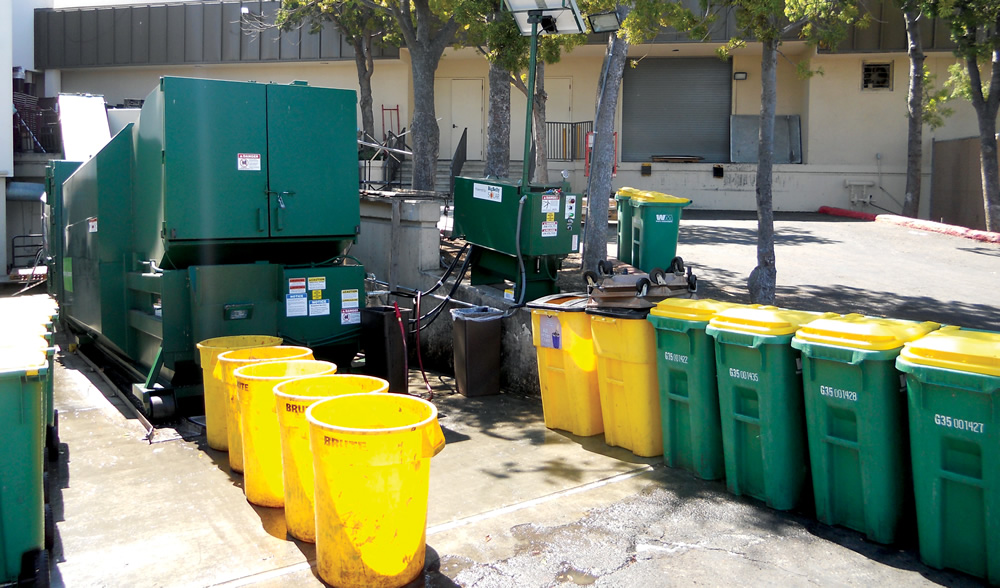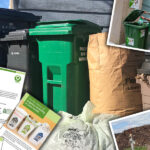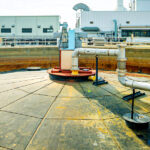Hotel with over 1,000 guest rooms is diverting close to 400 tons annually of preconsumer food trimmings and postconsumer food scraps.
Ana Carvalho
BioCycle February 2015
Learn more about the Sheraton San Diego Hotel & Marina’s food scraps diversion program
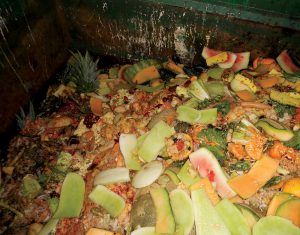
San Diego’s commercial organics program accepts all food scraps, coffee grounds and coffee filters, parchment paper, and paper towels and napkins from the kitchen. Photo by Ana Carvalho
In April 2014, participants of BioCycle’s 14th Annual Conference on Renewable Energy From Organics Recycling (REFOR14 West/28th Annual West Coast Conference) had the opportunity to tour the Sheraton San Diego Hotel and Marina (SSDHM) to view its food scraps collection program. The hotel was the first in the United States to receive the Green Seal Gold certification (2010 and 2011) for its ongoing sustainability initiatives, and is the largest, full-service Gold level certified property in the country. The Green Seal utilizes life cycle-based sustainability standards for products, services and companies and offers third-party certification. SSDHM was required to meet Green Seal’s checklist of criteria that included environmental compliance, waste minimization and recycling, bulk and environmentally preferable product purchasing, use of energy efficient equipment and supplies, and water conservation measures.
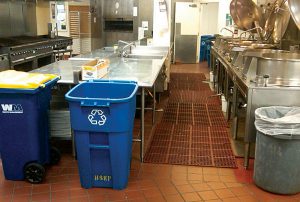
Two main kitchens at the Sheraton San Diego Hotel & Marina (SSDHM) serve an average of 2,500 meals/day. from the kitchen. Photo by Ana Carvalho
In early 2011, the hotel contacted the City of San Diego’s Environmental Services Department (ESD) to inquire about food waste diversion. Prior to contacting ESD, SSDHM was utilizing a process where enzymes transform food waste into grey water, and then discharging the by-product into the municipal sewer. The hotel’s experience with this system was not satisfactory.
Despite a recycling program and this food waste diversion system, the SSDHM was still at a 15 percent waste diversion rate, which was not acceptable to the hotel’s environmentally conscientious administration and staff. Assisted by one of the Environmental Specialists from ESD, the hotel enhanced its recycling program to comply with the City’s Recycling Ordinance. The ordinance requires recycling of paper, cardboard, plastic, metal and glass containers, cartons and rigid plastics including clean food waste containers, jugs, tubs, trays, pots, buckets, and toys. It also requires pairing recycling and trash containers, and proper signage on all recycling containers with a list and/or pictures of the mandatory recycling items. In addition hotels must inform their staff and guests of the mandate and how to recycle in the hotel.
Food Scraps To Composting
Once the enhanced recycling program was implemented, the hotel joined the City of San Diego’s commercial food scraps composting program in June 2011. The City’s program accepts all food scraps, coffee grounds and coffee filters, parchment paper, and paper towels and napkins from the kitchen. No compostable kitchen ware or to-go containers are accepted. To comply with the program’s requirements, city staff worked with the hotel to determine the best operational logistics for its kitchens’ staff and stewards, and trained all the hotel supervisors and as many staff as possible on the recycling and food scraps composting programs.
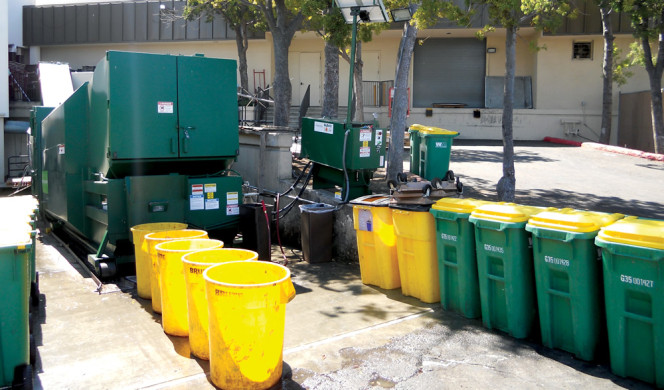
All containers and carts are brought to a central food waste collection area where they are emptied into a 20-cy solar-powered compactor, which utilizes about 50 percent less energy than a standard compactor. Photos by Ana Carvalho
As part of program logistics, all collection containers were color coded with different colors for trash, recycling and food scraps collection. To educate staff, signs with pictures of what materials to discard in each container were posted in very visible and easy-to-access areas for staff to follow. The goal was to make both programs simple, convenient and meaningful. With committed management and City training, the hotel successfully achieved all of these goals and developed a united team supporting its environmentally responsible procedures.
SSDHM has 1,053 guest rooms and suites, divided between two separated high-rise towers. The hotel also holds many special events and conventions throughout the year. Two main kitchens serve an average of 2,500 meals/day at its four restaurants, one full bar, and through its numerous catering services. Food scraps collection was implemented in two phases. It started in one tower using 32-gallon carts that were emptied into an open top roll-off container with a metal lid located at the hotel’s loading dock. A few months later, after running smoothly at the first tower, the program was expanded to the second tower. By then, food waste was congregated in a compactor that utilizes an automatic arm to empty the carts.
This progressive approach allowed hotel staff to adapt to the new routine, identifying and correcting any glitches in their internal collection system. Since implementation of the food scraps composting program, the hotel has been diverting close to 400 tons/year of preconsumer food trimmings and postconsumer food scraps from its restaurants, employee cafeteria and banquet operations. Excess edible food from its restaurants and banquets is repurposed at its associates’ cafeteria.
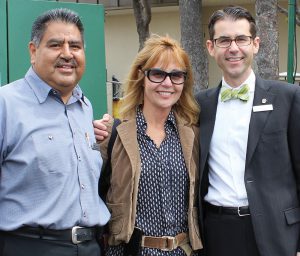
Rafael Villanueva, Executive Steward (left) and John Ford, Hotel Manager (right) with Ana Carvalho (center), an Environmental Specialist with the City of San Diego’s Environmental Services Department, who assisted the SSDHM with its recycling and organics diversion programs.
With implementation of the food scraps composting program and adjustments made in the recycling program, SSDHM has achieved an impressive 83 percent waste diversion rate, and is saving approximately 40 percent on its monthly hauling services for trash, recycling and composting. (The hauling services fee includes on-site containers, transportation, tipping fees at the landfill and composting facility, and processing fees at the recycling materials recovery facility.) Prior to the implementation of both programs, the hotel utilized two 20 cubic yard (cy) trash compactors; one was serviced six days a week and the other three days a week for a total of 680 cy/week of trash. Its current trash generation is a total of 36 cy/week.
Shrinking Footprint
The hotel continues to expand its efforts to achieve a smaller carbon footprint, and is already ahead of pace to achieve its 2020 goal of a 30 percent energy consumption reduction and 20 percent water consumption reduction. Approximately a year ago, SSDHM changed its central food waste collection container to a 20 cy solar compactor, which utilizes about 50 percent less energy than a standard compactor. The next step for SSDHM is to decrease its food waste generation by focusing on source reduction, a delicate and difficult task in the hospitality industry, but not impossible, especially when working with such a committed team.
The Sheraton San Diego Hotel & Marina’s sustainability achievements have not gone unnoticed. It received the California Green Lodging’s highest level of recognition (titled Two Palm Tree Leadership) and the California Hotel & Lodging Association’s Good Earthkeeping Award. And in 2013, SSDHM was awarded the Gold in TripAdvisor’s GreenLeaders program, the second highest possible ranking. Finally, the hotel received the 2012 Recycler of the Year and the 2013 Director’s Award from the City of San Diego Mayor for its waste reduction and recycling programs.
Ana Carvalho is an Environmental Specialist with the City of San Diego (CA) Environmental Services Department.


